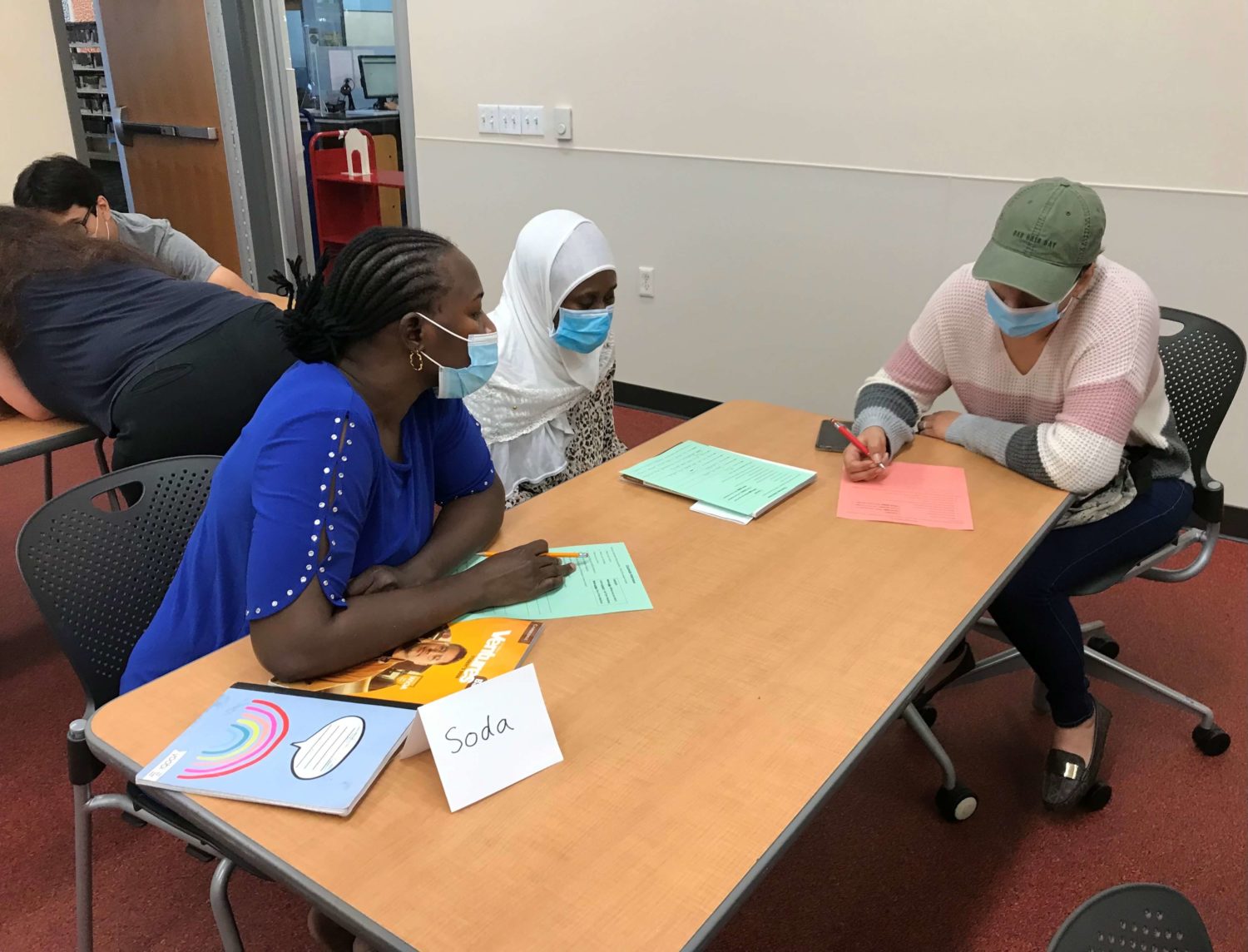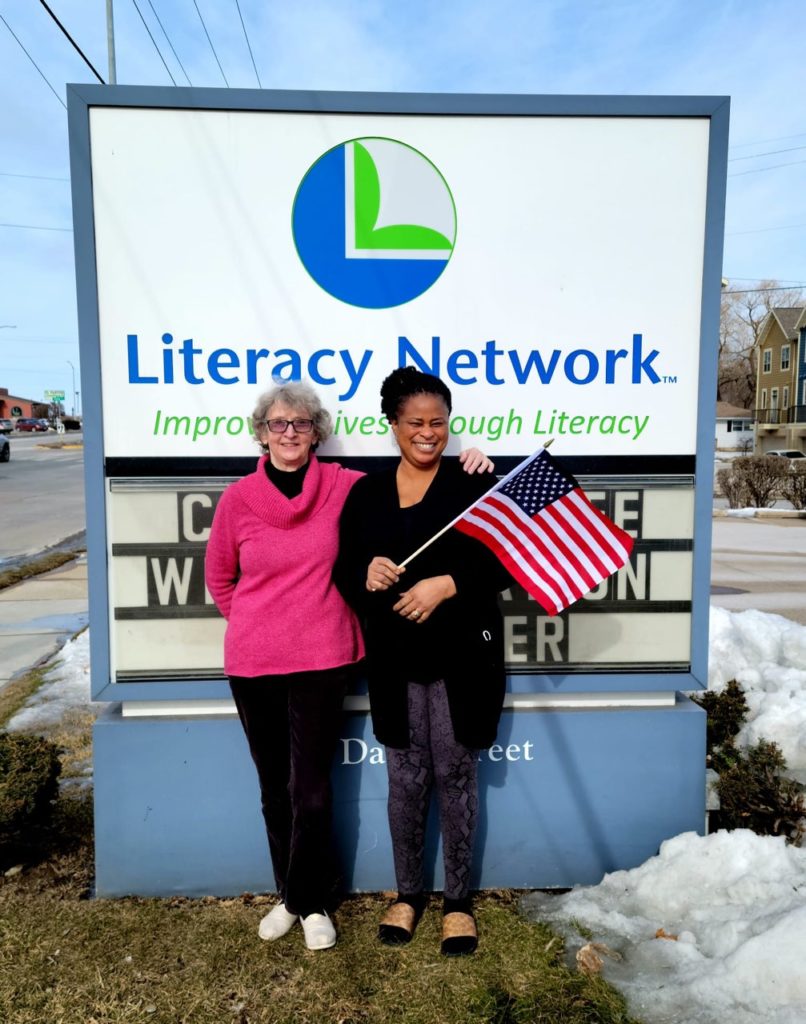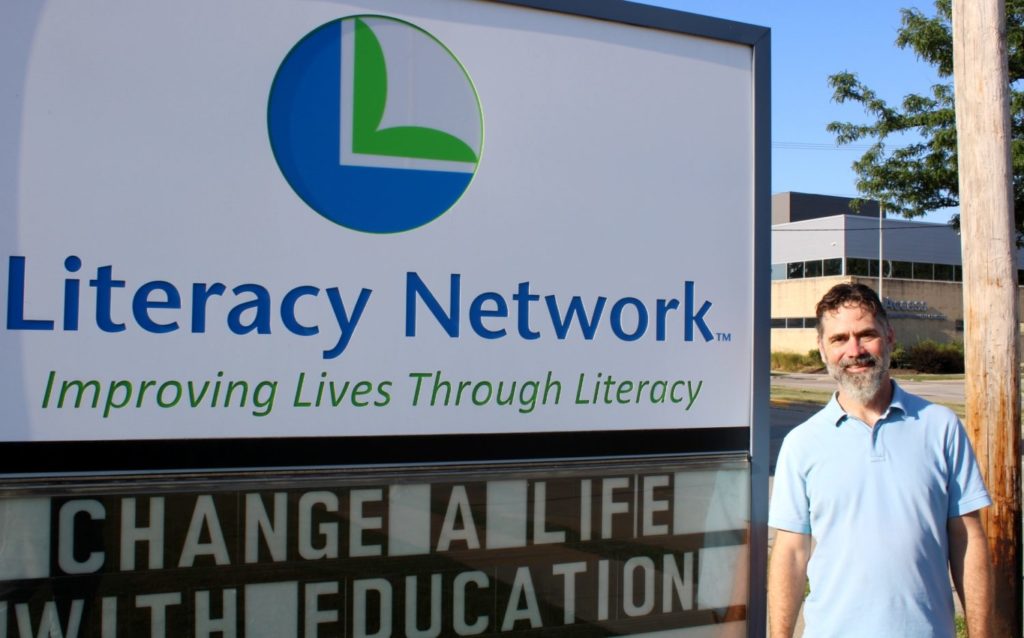
September marks the beginning of another school year and the turn into another fall season, but it also marks an important month for English language learners. September is also National Literacy Month, and Madison’s Literacy Network, headed by Executive Director Jeff Burkhart, has been leading the charge locally to help community members learn and master the English language.
“The Literacy Network has been around since 1974, and we’ve helped thousands of adults in our community to achieve their dreams through literacy,” said Burkhart. “We look at individual goals for each one of our students. Many of our students are English language learners, so about 85% of our students are working on their English skills. We also have students who are working towards getting their GED, or working on reading and writing skills, who were born in the United States and speak English as a native language. Before the pandemic, we served about 1,000 people each year. During the pandemic that kind of dipped into around 800. Now, we’re seeing a significant increase in the number of students who are reaching out to us.”
Besides the work the Literacy Network does throughout the year, September marks a special time as the perhaps lesser-known issue of adult literacy is highlighted. Things that come attached to literacy, such as work opportunity and navigating local settings, are brought to the forefront as crucial aspects of what the Literacy Network has to offer.
“As far as what this month means to us, I think it’s a good opportunity for us to kind of highlight the impact that literacy has on adults’ lives,” Burkhart said. “Along with the work that we and many other literacy organizations, locally and around the country, are doing to help support families. Many of the folks that we serve have low incomes, and they are working towards increasing their ability to earn more. We see the results on a regular basis, that once somebody has achieved an educational goal, they also achieved employment goals. Then they are better able to support their families.”

Along with the potential strides to be taken in the work market, students with the Literacy Network also benefit simply from the atmosphere of education and community. With a roster of great tutors and staff, the Literacy Network provides incentives to participate for the experience and personal benefits alone.
“What we see very regularly are students who have a sense of purpose and hope when they come in the door,” said Burkhart. “With that comes a great deal of increased confidence, and the sort of light that comes on is really tangible. We make our programs impactful, relevant, and most of all, fun. The work that we do has got a lot of levity to it.
“Our teachers are really great. They love teaching and they love to connect with their students, and they’re big cheerleaders,” Burkhart adds. “There’s a lot of really great fun work that happens. You can see it day in and day out in the classrooms and in the smiles on people’s faces when they’re working together. It’s a hopeful, friendly, and engaging environment.”
One aspect of learning that the Literacy Network stresses is setting attainable goals. Students in response have proven to know just how valuable the opportunity with the Literacy Network is by extending the reach of their participation all the way into higher education as many students look to pursue a degree as an initial goal, or in many cases after they achieve their goal of completing their high school education.
“More than half of our students tell us they want to eventually go to Madison College and get a degree,” Burkhart said. “That’s why our connection to the college is so important. We have done a lot of work with the college, in the School of Academic Advancement, in particular, to help students to succeed in either their basic English or adult basic education programming for high school completion. The next step would be to get into a degree program. We have those really strong connections with people that we consider colleagues at the college, and we have tutors in the classroom at the college. We connect the students that are working with us to the writing center at the college, and to the academic advisors. We use Madison College materials for a lot of what we do, because we know that’s what our students want, they want to be able to succeed there.”
The Literacy Network’s work alongside Madison College is just one piece of the outreach they do. Outreach work with the organization also happens in libraries and school districts across Dane County. What such a wide reach leads to is a constant ability to connect to potential students, and Burkhart was sure of their effectiveness in doing so with the increased participation from the community. “In May, which is the time that our summer semester starts, we had about a 55% to 60% increase in the number of students who reached out to us over the previous semester,” he said. “That meant, because we were still doing virtual registration, we had to really pull everybody together to do the registration process. We just didn’t have enough staff, so we didn’t have enough people to do it. In order to build the staff, we’ve been trying to raise money to hire more people to serve that need.”
Staffing is the next hurdle the Literacy Network is looking to pass as increased demand for services has created a related demand for those looking to help. Nothing may be quite as exemplary of the Literacy Network’s impact than their recent staffing of a former student, Hussein, who came over as a refugee from Iraq and obtained a high school diploma with the organization and is now working with them to provide the same opportunities for someone else as he moves towards a degree at Madison College. Burkhart made clear that staff like Hussein are more the rule than an exception as all of the staff and tutors with the Literacy Network show passion in their work, and always leave room open for anyone looking to join in and lend a hand.
“A lot of our tutors have been with us for multiple years,” Burkhart said. “They really see the impact and they love the work. The way that the tutoring program is organized works really well for them. They don’t have to worry about planning a lesson. You don’t have to be an expert in education, you just have to be able to come and help somebody work through the lesson, and be patient and encouraging with them. We have wonderful tutors who are doing that work, so that’s a big part of the operation. We have both classroom stuff and tutoring and then we get all these different partnerships in place.
“In a typical semester, we probably have 15 outreach classes that are happening in various other locations other than the Literacy Network,” Burkhart continues. “Workplaces, schools, libraries, and all these different programs that are happening in various spots. We are in South Madison, but we know that the need is all over Dane County. That’s our service area, so we try to do as many of those outreach programs as we can.”

(Photo by David Dahmer)
While the Literacy Network has already provided opportunity and community for many across Dane County, Burkhart was sure that they are far from their peak and have much more potential as any volunteer work or donation can make a difference and help extend their effectiveness even more.
“We’re still looking for volunteers, and you can find out about that on our webpage,” said Burkhart. “There’s a whole section about volunteering there. We are also doing an in-person event this month to help celebrate Literacy Month, and that is designed as a fundraiser. That’ll be on the 27th of September at the Sheraton. It’s a luncheon, so it’s free lunch, and we’ll have a really great presentation featuring our students. Hopefully, it inspires people to give and support the work. There are multitudes of ways that people can be involved as volunteers, not just as tutors. We’re always looking for folks who will be interested in doing their own fundraiser.”
As with many acts of giving or aid, any amount can help make sure that the Literacy Network can continue to provide great service to its clientele. With donors doing everything from a volleyball event where the proceeds go to the Literacy Network, to a ten-thousand-dollar anonymous match donation, there is no creativity or generosity that goes under-appreciated by the team at the Literacy Network. The future for the Literacy Network is reflective of that passion as even in a time of transition where Burkhart will be stepping down as executive director in December, the organization is focused on a smooth transition that will sustain the high quality of service they have been able to provide thus far.
“The transition is going great,” Burkhart said. “Our board and staff are engaged in the process as a search committee. I think we’re actually a little bit ahead of schedule, from what I laid out when I announced to the board in early May. I’m thrilled to see that, and I knew that we had the right team to do this. As far as the process goes, everything’s moving really well. My role has been to put together as comprehensive of a manual as I can so that I can support the next generation of leaders.”
If you are looking to get involved with the Literacy Network or want to keep up with their work and services, check out their website here.



